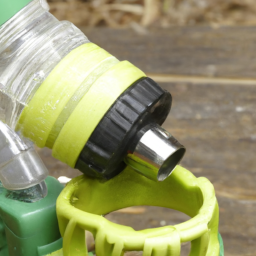How To Fix Garden Hose Spray Nozzle
Table of Contents []
- How To Fix Garden Hose Spray Nozzle
- Selecting the right garden hose nozzle
- Installing and attaching the garden hose nozzle
- Cleaning the garden hose nozzle
- Checking the spray settings
- Testing the water pressure
- Maintaining the nozzle
- Replacing the garden hose nozzle
- Common problems with garden hose nozzles
- The final word
How To Fix Garden Hose Spray Nozzle
When summer's here, there's nothing quite like enjoying a cooling spray from the garden hose. But when the water comes out weak and trickles instead of a spray you know something's wrong. But have no fear; with some DIY elbow grease and a few tools, you can get your garden hose nozzle spray back on track in no time. In this article, we'll explore eight central themes related to garden hose spray nozzle maintenance and repair, namely:
Selecting the right garden hose nozzle
Not all garden hose nozzles are created equal, so it pays to choose carefully. First, ensure that the nozzle is the right size for the hose you want an airtight fit. Next, read up on each type of spray nozzle and decide which one is best suited for the purpose you have in mind. Different types of nozzles provide different spray patterns and pressure settings. Finally, decide between a metal or plastic body metal will last longer but costs more, while plastic is more affordable.
Installing and attaching the garden hose nozzle
Now that you have the right garden spray nozzle for your needs, you'll need to install and attach it properly. Start by shutting off the water supply. Then unscrew the original nozzle and attach the new one, making sure it is screwed in firmly. Once that's done, check for any leaks in the connection and make sure nothing else needs replacing. Then you're all set to begin using your newly installed garden spray nozzle.
Cleaning the garden hose nozzle
It's important to clean your garden hose nozzle on a regular basis, as dirt, debris, and sediment can build up inside the nozzle and diminish its performance. Fill a bucket with soapy water and submerge the nozzle in it for at least half an hour. This will loosen the dirt and debris. Then use a soft brush to carefully scrub the inside of the nozzle, making sure to get into all the nooks and crannies. Then rinse the nozzle with fresh water and let it dry.
Checking the spray settings
Depending on the type of nozzle you have, you'll be able to adjust the spray settings to suit your needs. To check the spray settings, simply turn on the water supply and try out the various settings. If some of the settings don't seem to be functioning properly, it might be because water pressure is too low. You can try adjusting the nozzle to increase the pressure, or add an extra nozzle to the system to increase the flow.
Testing the water pressure
If the water pressure isn't up to par, it could be that the pipes need to be unclogged or the water pressure regulator needs adjusting. To test the water pressure, use a pressure gauge. This will let you know if the pressure is low and if adjustments need to be made.
Maintaining the nozzle
Regular maintenance will ensure that your garden hose nozzle lasts longer. After each use, make sure to turn it off properly and let it dry before storing it away. Also, check for rust, corrosion, and other damage, and make sure to replace worn parts when necessary. Periodically check the nozzle and gasket for tears and make sure there are no cracks or leaks.
Replacing the garden hose nozzle
If your garden hose nozzle is beyond repair or you just want to upgrade to a newer model, it's important to replace it properly. Start by shuttering off the water supply and removing the old nozzle. Make sure to put together the new nozzle properly and don't forget to check for any leaks or other malfunctions. Once everything is in order, you can turn the water back on and start using the new nozzle.
Common problems with garden hose nozzles
There are several common issues that can arise with garden hose nozzles. Clogging, leaking, and low water pressure are a few of the issues you might face. Leaks are often caused by worn or damaged parts, while clogging can be caused by dirt and debris. Low water pressure can be caused by underexpression of pipes or a faulty pressure regulator.
The final word
Maintaining a garden hose nozzle is surprisingly easy and doesn't require any special skills. All it takes is a bit of time and effort, and you'll have your garden hose ready to go in no time. Don't forget to regularly inspect the nozzle for any signs of wear and tear, and test the spray settings occasionally. With a little bit of regular maintenance, you'll keep your garden hose nozzle in shipshape condition for years to come.

Previous Page
Next Page
